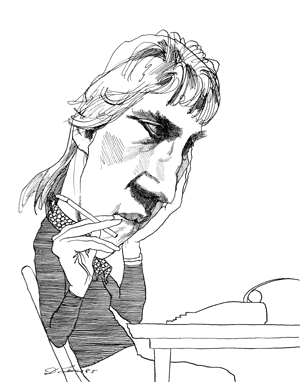Natalia Ginzburg (née Levi), one of the most distinguished writers of modern Italy, was born in Palermo in 1916 and died in 1991. During the 1920s and 1930s, as Fascism was taking hold, the family and the circle of intellectuals and artists with which they were connected were actively anti-Fascist. In 1938 she married the scholar Leone Ginzburg. They spent the early war years in political exile in Abruzzi, during which time Ginzburg wrote her first novel, La strada che va in città, published in 1942 under a pseudonym because of the racial laws limiting the rights of Jews. When they returned to Rome in 1944, Leone Ginzburg was arrested and died at the hands of the Fascists. Natalia Ginzburg went on to publish numerous novels, plays, and essays, as well as to found, with a group of fellow writers, the Italian publishing house Einaudi. The following memoir, written in 1944, appears in A Place to Live and Other Selected Essays of Natalia Ginzburg, published this month by Seven Stories Press.
Deus nobis haec otia fecit. *
In the Abruzzi there are just two seasons: summer and winter. Spring is snowy and windy like winter, and autumn is hot and clear like summer. Summer begins in June and ends in November. Gone are the long sun-baked days on the low, parched hills, the yellow dust of the streets and the children’s dysentery; winter sets in. People stop living in the streets; barefoot children disappear from the church steps. In the village I speak of, nearly all the men would vanish after the last harvests, going off to work in Terni, in Sulmona, in Rome. It was a village of bricklayers, and a number of the houses were elegantly built, with terraces and balustrades like small villas, so when you entered it was startling to find huge dark kitchens with prosciutti hanging from the ceiling, and vast, dreary, empty rooms. The kitchen fires would be lit; there were various kinds of fires—big ones made of oak logs, fires of leaves and branches, and fires made of dry twigs picked up one by one along the road. It was easy to distinguish the poor from the rich by their fires, easier than judging by the houses and the people, or their clothing and shoes, which were more or less the same for everyone.
When I first came to the village, all the faces seemed the same to me; the women, rich and poor, young and old, all looked alike. Nearly all had missing teeth: the women down there lose their teeth at thirty, from hard work and poor nutrition as well as from the strains of childbirth and nursing babies that come one after the other relentlessly. But soon, little by little, I could single out Vincenzina da Secondina, Annunziata da Addolorata, and I started visiting all the houses and warming myself at their various fires.
As the first snows began to fall, a slow sadness took hold of us. Our lot was exile: our city was far away, our books, our friends, the shifting ups and downs of a real existence, all far away. We would light our green stove with the long pipe running across the ceiling; we used to gather in the room with the stove—we cooked and ate there, my husband wrote at the big oval table and the children scattered their toys on the floor. A picture of an eagle was painted on the ceiling, and I would stare at the eagle, thinking that that was exile. Exile was the eagle, it was the humming green stove, it was the vast, silent countryside and the motionless snow. At five o’clock the bells of the church of Santa Maria rang and the women, with their black shawls and red faces, went to prayers.
Every evening my husband and I took a walk, every evening arm in arm, our feet plunged in snow. The people on our street were all friendly and familiar, and would come to their doors to greet us: “A good evening to you.” Now and then someone would ask: “Well, when are you going back home?” My husband would say, “When the war is over.” “And when will this war be over? You’re a professor, you know everything—when will it be over?” They called him “the professor” because they couldn’t pronounce his name, and they came from far and wide to consult him on all kinds of matters—the best time of year to have their teeth pulled, municipal subsidies, every variety of taxes.
In winter some old person would die of pneumonia, the bells of Santa Maria tolled the death knell, and Domenico Orecchia, the carpenter, built the casket. A woman went crazy and was taken to the asylum at Collemaggio and the whole town talked about it for quite a while. She was young and clean, the cleanest woman in the village: they said it must have been because of her great cleanliness. Girl twins were born to Gigetto di Calcedonio, who already had boy twins, and he made a big fuss in the town hall because they wouldn’t give him a subsidy, seeing as he owned several acres of land and a vegetable garden as big as seven cities. Rosa, the school caretaker, had a neighbor who spit in her eye, and she went around with a bandage on it in order to collect damages: “Eyes are sensitive and spit is salty,” she explained. And they talked about this for quite some time too, until there was nothing left to say.
Advertisement
We grew more homesick every day. It was even pleasant at times, mildly heady, like being in the company of close friends. Letters from our city came bearing news of weddings and deaths we couldn’t take part in. At times the nostalgia turned sharp and bitter, turned into hatred: then we hated Domenico Orecchia, Gigetto di Calcedonio, Annunziatina, and the bells of Santa Maria. But we kept this hatred hidden, knowing it to be unjust, and our house was always full of people, some come to ask and others to offer favors. Sometimes the little dressmaker came to make us sagnoccole. She would tie a dishtowel around her waist and beat eggs, and send Crocetta all over town to find someone who could lend us a big enough pot. Her red face was absorbed in her work and her eyes glittered with an imperious will. She would have let the house go up in flames just to have her sagnoccole turn out good. Her clothes and hair grew white with flour, as the strips of dough were carefully spread out on the oval table where my husband used to write.
Crocetta was our cleaning woman. She wasn’t a woman, actually, since she was only fourteen years old. The dressmaker found her for us. The dressmaker divided the world into two camps: those who comb their hair and those who don’t. You have to steer clear of those who don’t comb their hair, for of course they have lice. Crocetta combed her hair, and therefore she came to work for us and told the children long stories of deaths and cemeteries. Once upon a time there was a child whose mother died. His father married a new wife and this stepmother didn’t love the boy. So she killed him while the father was out in the fields, and made a stew out of him. The father came home and ate, but when he finished, the bones left on the plate started singing:
My stepmother mean and cruel
Cooked me into a gruel
And my greedy father ate
Every bite upon his plate.
The father killed his wife with a scythe and hung her from a nail on the front door.
Sometimes I catch myself humming the words of this song, and then the whole village rises up before me, bringing the special flavor of its seasons, the icy gusts of wind, the sound of the bells.
I took my children out every morning. People were shocked and scolded me for exposing them to the cold and snow. “What sin did these poor creatures commit?” they would say. “This is no weather for walking, Signora. Go back home.” We took long walks through the deserted white countryside, while the rare people we met up with looked pityingly at the children. “What sin did they commit?” Down there if a baby is born in winter they don’t take him outdoors till summertime. At noon my husband would join me with the mail, and we all went home together.
I told the children about our city. They were very small when we left, and had no memories of it. I told them how the houses had many floors and there were lots of streets and buildings and beautiful stores. “But here we have Girò’s,” the children said.
Girò’s shop was right opposite our house. Girò stood in the doorway like an old owl, his round, impassive eyes fixed on the street. He sold a little of everything—groceries, candles, postcards, shoes, oranges. When the goods arrived and Girò unloaded the cartons, the children would run over to eat the rotten oranges he threw away. At Christmas, almond nuggets and liquors and candies arrived too. But he would never give an inch on the prices. “You’re so mean, Girò,” the women said. And he’d retort, “If you’re good you get eaten alive.” At Christmas the men returned from Terni and Sulmona and Rome, stayed a few days, then left after slaughtering the pigs. For several days people ate nothing but pork sausages and scraps of fried bacon, and did nothing but drink. Then the cries of the new piglets would fill the streets.
Advertisement
In February the air grew damp and soft. Heavy gray clouds drifted across the sky. One year during the thaw, the gutter pipes burst. Water poured into the houses till the rooms were virtual swamps. It was like this all over town; not a single house was dry. The women emptied buckets out the windows and swept water from the doorsteps. Some people slept under open umbrellas. Domenico Orecchia said it was a punishment for some sin. This went on for more than a week, until at last every trace of snow was gone from the rooftops and Aristide repaired the pipes.
The end of winter awakened a vague restlessness in us. Maybe someone would come to visit, maybe something would finally happen. Surely our exile, too, must have an end. The roads cutting us off from the world seemed shorter, the mail came more often. All our chilblains slowly healed.
There is a certain dull uniformity in human destiny. The course of our lives follows ancient and immutable laws, with an ancient, changeless rhythm. Dreams never come true, and the instant they are shattered, we realize how the greatest joys of our life lie beyond the realm of reality. The instant they are shattered we are sick with longing for the days when they flamed within us. Our fate spends itself in this succession of hope and nostalgia.
My husband died in Regina Coeli prison in Rome a few months after we left the village. When I confront the horror of his solitary death, of the anguished choices that preceded his death, I have to wonder if this really happened to us, we who bought oranges at Girò’s and went walking in the snow. I had faith then in a simple, happy future, rich with fulfilled desires, with shared experiences and ventures. But that was the best time of my life, and only now, now that it’s gone forever, do I know it.
—Translated from the Italian by Lynne Sharon Schwartz
This Issue
May 23, 2002
-
*
”God has granted us this respite,” Virgil, Eclogues, I, v. 6.
↩




